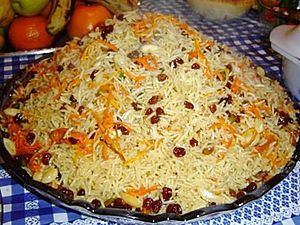Kabuli pulao facts for kids

Qabeli palaw
|
|
| Alternative names | Qabili palaw, Kabuli palaw, Uzbaki palaw, Bukhari rice |
|---|---|
| Type | Rice |
| Course | Lunch, dinner |
| Place of origin | |
| Region or state | Central Asia |
| Created by | Afghan cuisine |
| Serving temperature | Hot |
| Main ingredients | Steamed rice, raisins, carrots, and lamb or beef |
Qabeli palaw (also spelled Kabuli palaw) is a very popular and special pilaf dish from Afghanistan. It is made with fluffy steamed rice mixed with sweet, caramelized carrots and raisins. The dish also includes tender pieces of marinated lamb or beef.
People often decorate Qabeli palaw with crunchy almonds and pistachios. Sometimes, a little saffron is added to the rice or sauce for extra color and flavor. This delicious rice dish has spread from Afghanistan to other parts of Central Asia and Western Asia.
What's in the Name?
Even though many people call it "Kabuli palaw," this dish probably did not start in Kabul, the capital city of Afghanistan. It is more likely that Qabeli palaw came from northern Afghanistan, especially near the border with Uzbekistan.
A similar version of the dish is made by Uzbek people in Afghanistan, and they call it "Uzbaki palaw." The Uzbaki way of cooking it is a bit different. Instead of soaking, partly boiling, and then steaming the rice until it's super fluffy, they just boil the rice until all the water is gone.
Sometimes, Afghans who live in places like Dubai or Istanbul sell this dish as "Bukhari rice." This name also suggests it might have come from the border area between Afghanistan and Uzbekistan. However, "Bukhari rice" dishes found in other countries might be quite different from the traditional Qabeli palaw.
A Special Meal
Qabeli palaw is seen as a very important and festive dish in Afghanistan. This is because it uses high-quality ingredients and is a well-known part of Afghan cuisine.
People often serve Qabeli palaw as the main course for lunch or dinner. It can be eaten with traditional side dishes or prepared for big celebrations and banquets.
See also
 In Spanish: Kabuli pulao para niños
In Spanish: Kabuli pulao para niños
 | Roy Wilkins |
 | John Lewis |
 | Linda Carol Brown |

